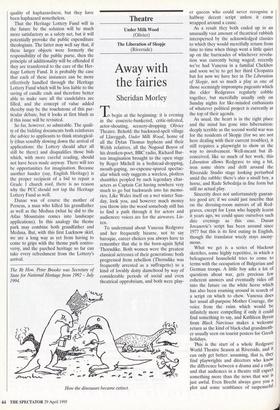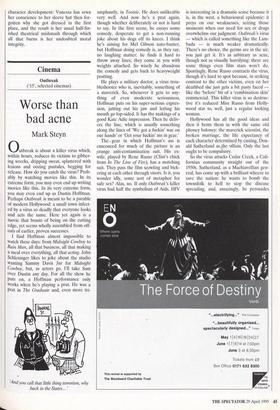Theatre
Under Milk Wood (Olivier) The Liberation of Skopje (Riverside)
Away with the fairies
Sheridan Morley
Tbegin at the beginning: it is evening in the concrete-bunkered, critic-infested, actor-shouting, scenery-dropping Olivier Theatre. Behold: the backward-spelt village of Llareggub, Under Milk Wood, home of all the Dylan Thomas hyphens and their Welsh relatives, all the Nogood Boyos of his drunken-poet, BBC radio, Richard Bur- ton imagination brought to the open stage by Roger Michell in a bedstead-dropping, mouth-gaping, no-expense-spared spectac- ular which only suggests a wireless, plotless shambles peopled by such legendary char- acters as Captain Cat having nowhere very much to go but backwards into his memo- ries. Like Wales itself on a wet winter Sun- day, look you, and however much money you throw into the wood somebody still has to find a path through it for actors and audiences: voices are for the airwaves. Lis- ten.
To understand about Vanessa Redgrave and her frequently bizarre, not to say baroque, career choices you always have to remember that she is the born-again Sybil Thorndike. Both women were the greatest classical actresses of their generations: both progressed from rebellion (Thorndike was frequently arrested as a suffragette) to a kind of lovably dotty damehood by way of considerable periods of social and even theatrical opprobrium, and both were play-
er queens who could never recognise a halfway decent script unless it came wrapped around a cause.
As a result they both ended up in an unusually vast amount of theatrical rubbish interspersed by the acknowledged classics to which they would mercifully return from time to time when things went a little quiet up on the barricades of whichever revolu- tion was currently being waged; recently we've had Vanessa in a familial Chekhov and soon we're to get her third Cleopatra but for now we have her in The Liberation of Skopje, not so much a play as one of those seemingly impromptu pageants which the elder Redgraves regularly cobble together, but mercifully usually only on Sunday nights for like-minded enthusiasts of whatever political project is currently at the top of their agenda.
As usual, the heart is in the right place and the mind has gone into hibernation: deeply terrible as the second world war was for the residents of Skopje (for we are not here dealing with their current troubles), it still requires a playwright to show us the way to involvement. Well-meant but ill- conceived, like so much of her work, this Liberation allows Redgrave to sing a bit, iron some shirts and drift around the Riverside Studio stage looking perturbed amid the rubble: there's also a small boy, a horse, and Rade Sebedzija in fine form but still no actual play.
Sincerity does not unfortunately guaran- tee good art; if we could just inscribe that on the dressing-room mirrors of all Red- graves, except for Lynn who happily learnt it years ago, we could spare ourselves such dire evenings as this one. Dusan Jovanovic's script has been around since 1977 but this is its first outing in English, though the translator wisely stays anony- mous.
What we get is a series of blackout sketches, some highly repetitive, in which a beleaguered household tries to come to terms with the occupation of Bulgarian and German troops. A little boy asks a lot of questions about war, gets precious few coherent answers and eventually rides off into the future on the white horse which has also been roaming around in search of a script on which to chew. Vanessa does her usual all-purpose Mother Courage, the voice from the ruins which would be infinitely more compelling if only it could find something to say, and Kathleen Byron from Black Narcissus makes a welcome return as the kind of black-clad grandmoth- er usually seen on tourist posters for Greek holidays. This is the start of a whole Redgrave World Theatre Season at Riverside, and it can only get better: assuming, that is, they find playwrights and directors who know the difference between a drama and a rally, and that audiences in a theatre still expect something more than the news that war is just awful. Even Brecht always gave you a plot and some semblance of suspenseful character development: Vanessa has sewn her conscience to her sleeve but then for- gotten why she got dressed in the first place, and the result is her usual half-fin- ished theatrical mishmash through which all that burns is her undoubted moral integrity.



























































 Previous page
Previous page